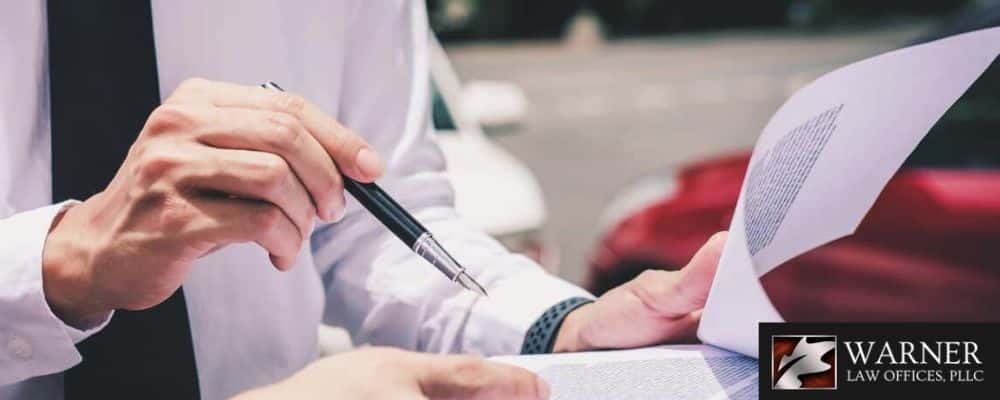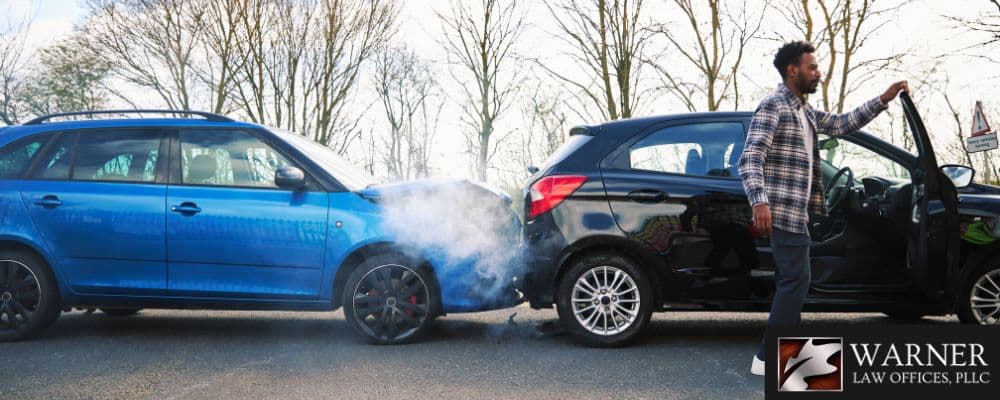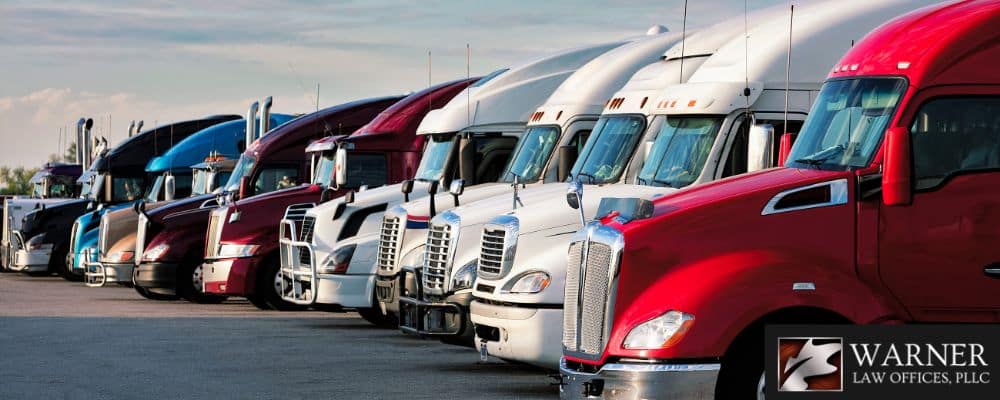
Table Of Contents
- What Does “Settlement” Mean?
- Investigate the Accident and Gather Evidence
- Negotiating a Settlement Offer
- Accepting or Rejecting a Settlement Offer
- Filing a Car Accident Lawsuit in West Virginia
- How Long Do I Have to Sue After a West Virginia Car Accident?
- What To Do Immediately After a West Virginia Car Accident
- Contact a West Virginia Car Accident Lawyer
- Frequently Asked Questions
- Contact Warner Law Offices for Help With Your Car Accident Case
If you’ve been involved in a car accident, we understand the physical, emotional, and financial toll it can take. Our team is here to help you navigate the complexities of personal injury claims, ensuring you receive the compensation and justice you deserve.
At Warner Law Offices, PLLC, our West Virginia personal injury lawyers are well-versed in the car accident settlement process. From settlement negotiations to a full-fledged trial, we are dedicated to providing the highest-quality legal representation available.
If you were injured in a car accident anywhere in the state, including Charleston, Morgantown, or Huntington, we are here to help. Call (304) 345-6789 or fill out our online contact form to schedule your free consultation.
What Does “Settlement” Mean?
A settlement in a car accident case refers to an agreement reached between the parties involved, typically the injured party and the insurance company representing the at-fault party, to resolve the legal claim without going to trial. In a settlement, the parties agree to a specific amount of compensation to be paid to the injured party in exchange for releasing the at-fault party from further liability related to the accident.
The terms of the settlement are documented in a written agreement, and once signed, the case is considered resolved, and the injured party receives the agreed-upon compensation. Settlements can cover various damages, including medical expenses, lost wages, and pain and suffering.
It is critical to consult an experienced car accident attorney before accepting a settlement. Insurance companies sometimes make quick settlement offers to end cases. If you haven’t fully evaluated your damages, such as the long-term effects of your injuries on your ability to work, you will face future losses with no additional compensation.


If you’ve been injured in an accident contact Warner Law Offices, PLLC, named the top premier law firm in the U.S.
Investigate the Accident and Gather Evidence
The quality of your evidence is critical to proving liability after a car accident. Your attorney can help you gather the evidence needed to substantiate your claim during settlement negotiations. Important evidence may include things like:
- Photos and videos of the scene
- Police reports
- Witness statements
- Medical treatment and billing records
- Vehicle damage estimates
- Black box data
- Cell phone records
- Accident reconstruction reports
- Documentation of lost wages and lowered earning capacity
- Surveillance footage
- Driving histories
- Weather and road conditions
Often, strong expert testimony and forensic evidence turn the tide of a case. In our many years of personal injury practice, we have developed extensive resources and professional connections to help us collect all available evidence in the cases we handle.
Negotiating a Settlement Offer
Car accident settlement negotiations involve discussions between the parties to reach a resolution outside of court. Typically, the injured party’s attorney and the insurance company representing the at-fault party engage in these negotiations.
Negotiations may involve multiple rounds of offers and counteroffers until both sides agree on a settlement amount. Factors such as the strength of the evidence, the severity of injuries, and the potential costs of going to trial influence the negotiation process.
Accepting or Rejecting a Settlement Offer
The decision to accept or reject a settlement offer at any point in the negotiation process is yours alone. However, an experienced car accident attorney can advise you on whether the offer is fair. Here are some common reasons accident victims reject insurer settlement offers:
- Inadequate Compensation – The offered amount does not fully cover your medical expenses, lost wages, or other damages resulting from the accident.
- Uncertain Future Costs – You anticipate ongoing medical treatment or future expenses related to your injuries that are not adequately addressed in the settlement offer.
- Disputed Liability – You believe the other party is more at fault for the accident than what the settlement offer acknowledges.
- Non-economic Damages – The offered amount does not adequately compensate for pain and suffering, emotional distress, or loss of enjoyment of life.
- Additional Damages – The settlement offer fails to account for any additional damages you may be entitled to, such as punitive damages or lowered future earning potential.
- Strength of Case – You believe that proceeding to trial would result in a more favorable outcome based on the strength of your case and the evidence available.
- Unfair Terms – The settlement offer includes terms or conditions that are not acceptable to you, such as confidentiality clauses or waivers of future claims.
Ultimately, it’s essential to carefully consider all aspects of a settlement offer and consult your attorney before deciding to accept or reject it. Your attorney may advise against accepting an offer based on their professional assessment of your case and potential outcomes.
Filing a Car Accident Lawsuit in West Virginia
Again, whether your case is ultimately resolved in out-of-court settlement negotiations or before a judge or jury depends largely on the quality of your evidence, the strength of your case, the extent of your injuries and losses, and the at-fault party’s willingness to negotiate.
With that said, suing for a car accident typically involves several key steps. Initially, you or your attorney will file a complaint with the appropriate court, outlining the details of the accident and the damages you’re seeking. The defendant named in the complaint will then be served with a copy of the complaint and given an opportunity to respond.
Discovery follows, during which both parties exchange relevant information, such as witness statements, medical records, and accident reports. Depositions may also be conducted, where parties provide sworn testimony.
Pre-trial motions may be filed, and if the case proceeds to trial, both sides present their evidence and arguments before a judge or jury. Ultimately, the judge or jury will render a verdict, determining liability and any damages owed.
How Long Do I Have to Sue After a West Virginia Car Accident?
The West Virginia statute of limitations for personal injury claims gives car accident victims two years from the date of injury to file a lawsuit. Estate representatives also have two years from the date of death to file a wrongful death lawsuit on behalf of surviving loved ones if a car accident results in death.
Though there are narrow exceptions to these deadlines, consult with our car accident lawyers before relying on them. Statutes of limitations are strictly enforced by courts, and failure to file before the correct deadline passes will destroy your right to seek legal compensation. It will also destroy your bargaining power in out-of-court settlement negotiations when the at-fault party realizes you can no longer sue.
What To Do Immediately After a West Virginia Car Accident
Knowing what to do after a car accident can help you protect your well-being, right to compensation, and bargaining power during settlement negotiations. Take the following steps where possible after being involved in a West Virginia car accident:
- Check for Injuries – Check yourself and others involved in the accident for injuries. Call emergency services if anyone is injured or requires medical attention.
- Move to Safety – If it’s safe to do so, move vehicles to the side of the road to avoid blocking traffic and reduce the risk of further accidents.
- Call the Police – Report the accident to law enforcement and cooperate with their investigation. Request a police report, which can be valuable for insurance claims and legal proceedings.
- Exchange Information – Exchange contact and insurance information with the other parties involved in the accident, including names, addresses, phone numbers, insurance policy details, and vehicle registration information.
- Document the Scene – Take photos and videos of the accident scene, including vehicle damage, skid marks, road conditions, and any visible injuries. Gather witness contact information if possible.
- Seek Medical Attention – Even if you don’t feel injured, it’s essential to seek medical attention promptly. Some injuries may not be immediately apparent, and documentation of injuries is crucial for insurance claims and legal proceedings.
- Preserve Evidence – Preserve any evidence related to the accident, including medical records, repair estimates, and correspondence with insurance companies.
- Limit Conversation – Avoid admitting fault or making statements that could be interpreted as an admission of liability. Stick to factual information when discussing the accident with others.
How Do I Report a Car Accident in West Virginia?
Report your accident to the local police department, the county sheriff’s office, or the West Virginia State Police. Under West Virginia law, you must report accidents involving injuries, death, or property damage totaling $1,000 or more. Cooperate with law enforcement and request a police report, as it will serve as crucial documentation for insurance claims and legal proceedings in your personal injury case.
Contact a West Virginia Car Accident Lawyer
Contacting an experienced car accident attorney early on after your accident should be at the top of your to-do list. Doing so will give your attorney maximum time to evaluate your case and build the strongest claim possible on your behalf. Among other things, the legal team at Warner Law Offices offers:
- Legal Guidance – Expert advice on your rights and options.
- Investigation – Assistance in gathering evidence to support your claim.
- Negotiation – Skilled negotiation with insurance companies for fair compensation.
- Representation – Legal representation in court if needed.
- Maximized Compensation – Pursuit of maximum compensation for your injuries and losses.
We have the skills, experience, and resources needed to take on all kinds of auto accident cases. Whether you were involved in a car accident, motorcycle accident, truck accident, pedestrian accident, or any other kind of personal injury scenario on West Virginia roads, we are here to help.
Frequently Asked Questions
Understandably, clients often have lots of questions after a car accident. Below are some of the most common questions we receive.
What Car Insurance is Required in West Virginia?
West Virginia is an at-fault state. That means the person responsible for the accident pays for the damages through their insurance. Currently, minimum auto liability insurance coverage in West Virginia is set at:
- $25,000 for one crash, one injury
- $50,000 for one crash, two or more injuries
- $25,000 for property damage
What Documents Do I Need to Process My Car Accident Claim?
All sorts of important documents may come into play in your case, including insurance policies, medical records, bills, vehicle damage estimates, witness statements, photographs, correspondence with insurers, records of lost wages, and receipts for expenses. Our attorneys can help you gather the evidence needed to substantiate your claim.
How Do I Calculate the Value of My Car Accident Claim?
Calculating the value of a car accident claim requires a close look at the facts and available evidence in each case. Personal injury damages normally fall into two categories: economic and non-economic.
Economic damages are tangible and measurable losses, such as medical expenses, lost wages, and property damage. They aim to compensate the injured party for financial losses directly resulting from the accident.
Non-economic damages, on the other hand, are more subjective and cover intangible losses, including pain and suffering, emotional distress, and loss of enjoyment of life. These damages seek to compensate for the physical and emotional toll of the injury.
Why Do Insurance Companies Take So Long To Pay Out?
Insurance companies delay compensating accident victims for their own benefit, engaging in tactics such as delaying investigations, undervaluing claims, or denying valid claims altogether to minimize payouts and protect their profits. At the end of the day, insurers prioritize their bottom line over the well-being of claimants, leading to frustrating experiences and prolonged legal battles.
Contact Warner Law Offices for Help With Your Car Accident Case
If you’ve been in a West Virginia car accident, reach out to our experienced personal injury lawyers by calling (304) 345-6789 or filling out our online contact form. We are a full-service personal injury law firm with the skills and resources needed to guide you through the car accident settlement process. If a fair settlement cannot be achieved through negotiation, our car accident attorneys are not afraid to take your case to court.




